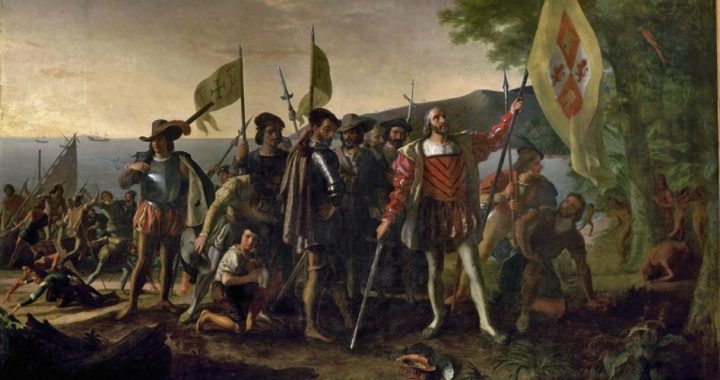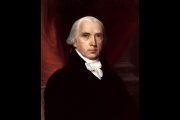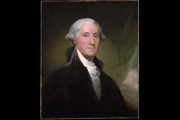
On the 11th of October, 523 years ago, on board the small, but sturdy, caravel Niña, a sailor peered down into the heaving ocean and saw a branch, its stalks and twigs loaded with berries. Aboard the two ships accompanying the Niña other sailors had noticed a log and were cheered to find a piece of wood that looked as if it had been worked by human hands. It seemed that the long voyage might finally be coming to an end. Of his crew this day, the commander of the expedition, Cristoforo Colombo — Christopher Columbus — wrote, “These signs encouraged them, and they all grew cheerful.”
Two hours after midnight on Friday, October 12, 1492, Columbus’ tiny fleet hove to in sight of an island, the first land seen by the expedition in weeks. They hadn’t reached the then near mythic land of Cipangu (Japan) as they had hoped, nor had they found India, but they had discovered for Europe the existence of the West Indies. At daylight they saw people on the island, and Columbus went ashore. Touching land in the New World for the first time, he was greeted by a crowd of curious island natives. Columbus recorded what happened next:
As I saw that they were very friendly to us, and perceived that they could be much more easily converted to our holy faith by gentle means than by force, I presented them with some red caps, and strings of beads to wear upon the neck, and many other trifles of small value, wherewith they were much delighted, and became wonderfully attached to us. Afterwards they came swimming to the boats, bringing parrots, balls of cotton thread, javelins, and many other things which they exchanged for articles we gave them, such as glass beads, and hawk’s bells; which trade was carried on with the utmost good will.
Campaign of Condemnation
In recent years, there has been very little good will remaining for Columbus. He is seen by the radical Left as the vanguard of an invasion of hateful Europeans who in their greed and racism couldn’t wait to wipe out or subjugate the noble savages of the New World.
During the 1992 quincentennial celebration of his arrival in the Americas, the campaign of stinging invective reached its peak. Russell Means, of the radical leftist American Indian Movement, went so far at the time as to claim that Columbus “makes Hitler look like a juvenile delinquent” by comparison. The campaign against Columbus has continued ever since. This year, Hugo Chávez, Venezuela’s version of Fidel Castro, announced that “Christopher Columbus was the spearhead of the biggest invasion and genocide ever seen in the history of humanity.”
Dawn of Modern History
It is true that the world changed irretrievably on October 12, 1492, but contrary to left-wing opinion, it changed for the better. This change wasn’t primarily in the New World. There, for millennia, tribe after tribe and civilization after civilization rose to power and oppressed and enslaved its neighbors, only to be oppressed and enslaved itself as soon a new power came on the scene. In this respect, the history of the New World is no different from the history of the Old, and the Spanish and other Europeans were just the latest to rise to power over the inhabitants of the Americas.
In Europe, though, the discovery of the New World was a watershed event, changing perspectives and encouraging new endeavors and modes of thought. These and subsequent explorations “opened up the human imagination,” writes professor Timothy Ferris of the University of California at Berkeley.
Ferris has been critical of Columbus, but in his book, Coming of Age in the Milky Way, he admits the importance of Columbus’ discoveries as well as those of the other explorers who followed in his footsteps. These, he writes, prompted an “expansion in the cosmos of the mind.”
Historian Will Durant, in the sixth volume of his monumental eleven volume Story of Civilization, was more effusive in his summary of the aftermath of Columbus’ explorations. They caused, he notes, a revolution in economics. Europe found new materials and new markets in the Americas and as a result, Durant writes, “Industry was stimulated in Western Europe, and demanded the mechanical inventions, and better forms of power, that made the Industrial Revolution.” What Durant calls “the moral and mental effects” of the explorations were just as far-reaching. “Christianity was spread over a vast hemisphere,” he notes. Meanwhile, “The European intellect was powerfully moved by the revelation of so many peoples, customs, and cults,” planting the seeds, good and bad, of the Enlightenment. Above all, Durant writes, “all limits were removed; all the world was open; everything seemed possible. Now, with a bold and optimistic surge, modern history began.”
Columbus inaugurated the modern age, and consequently, does not deserve the campaign of vilification that has been conducted against him. Instead, his achievement deserves respect. As a civilization, we wouldn’t be where we are without him.
Image: Landing of Columbus by John Vanderlyn
This article has been adapted from material originally published in the November 3, 2003 issue of The New American.



